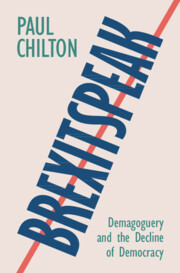
-
Select format
-
- Publisher:
- Cambridge University Press
- Publication date:
- 22 November 2024
- 05 December 2024
- ISBN:
- 9781108892681
- 9781108840811
- 9781108744027
- Dimensions:
- (229 x 152 mm)
- Weight & Pages:
- 0.46kg, 224 Pages
- Dimensions:
- (229 x 152 mm)
- Weight & Pages:
- 0.33kg, 224 Pages
You may already have access via personal or institutional login
Book description
Were we talked into Brexit? And who is 'we'? It's impossible to do politics without words and a context to use them in. And it's impossible to make sense of the phenomenon of Brexit without understanding how language was used – and misused – in the historical context that produced the 2016 referendum result. This interdisciplinary book shows how the particular idea of 'the British people' was maintained through text and talk at different levels of society over the years following World War II, and mobilised by Brexit propagandists in a socially, economically and culturally divided polity. The author argues that we need the well-defined tools of linguistics and language philosophy, tied in with a political science framework, to understand a serious, modern concept of demagoguery. Written in an accessible manner, this book is essential reading for anyone who wants to probe the social, political and ideational contexts that generated Brexit.
Reviews
‘As important as it is interesting, this incisive book is essential reading for anyone trying to make sense of how Brexit happened and what it is.’
A. C. Grayling
‘Paul Chilton provides a brilliant analysis of Brexitspeak as more than a passing fad by demonstrating its links it to fundamental rhetorical, cognitive and socio-cultural changes in British and international political discourse such as neo-nationalism, populism and post-truth ideologies.’
Andreas Musolff - Professor Emeritus, University of East Anglia
‘This brilliant book will help answer some of the crucial questions currently worrying democratic countries: how to understand and combat the lies and deceitfulness- the Brexitspeak- that led to the UK leaving the European Union in 2016; how to counter the shameless demagoguery, duplicity and untruths deployed by dictators and would be Presidents; and how to argue against those who aim to destroy democratic constitutions. It should be read by all those who wish to understand the language of liars and populists and learn how to combat them.’
Sally Tomlinson - Emeritus Professor at Goldsmiths London University Sally and Honorary Research Fellow, Department of Education, University of Oxford
‘Finally, we can understand and explain why Brexit actually happened. In Paul Chilton’s outstanding detailed analysis of the range of discourses mobilizing the anti-EU demagogy in the UK, the populist propaganda is deconstructed and illustrated, specifically in respect to Britain’s national identity politics. A must-read for everybody, scholars and lay-persons alike!’
Ruth Wodak - Distinguished Professor of Discourse Studies, Lancaster
Contents
Metrics
Altmetric attention score
Full text views
Full text views help Loading metrics...
Loading metrics...
* Views captured on Cambridge Core between #date#. This data will be updated every 24 hours.
Usage data cannot currently be displayed.
Accessibility standard: Unknown
Why this information is here
This section outlines the accessibility features of this content - including support for screen readers, full keyboard navigation and high-contrast display options. This may not be relevant for you.
Accessibility Information
Accessibility compliance for the PDF of this book is currently unknown and may be updated in the future.

